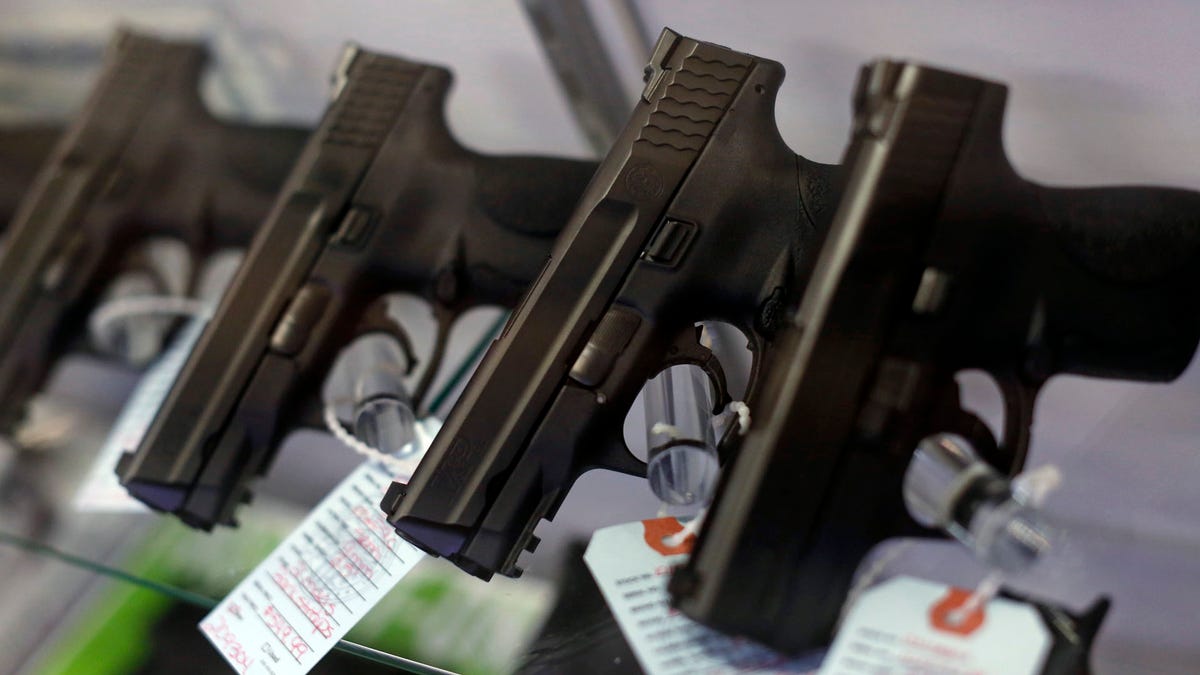
FILE -- Handguns are seen for sale in a display case. (REUTERS/Jim Young)
The media’s pro-gun control bias doesn’t just distort news coverage. TV networks have used their primetime entertainment shows to portray gun rights advocates as dishonest, extremist and unconcerned about the loss of innocent lives. At the same time, advocates of gun control are portrayed as caring, upstanding and responsible citizens.
The gun control debate isn’t portrayed as having two sides. It’s a morality play of good versus evil.
NBC might be the worst network, but it’s a tight race. It seems to have given marching orders to its TV writers to churn out scripts demonizing law-abiding gun owners and lionizing those who want to slap strict new controls on gun ownership, even if that means disregarding the Second Amendment to the Constitution.
Recently the NBC show “Taken” (Season 2, Episode 11) tried to convey to viewers that gun-free zones work because the criminals won’t disobey the bans.
Santana (Jessica Camacho) asks Bryan Mills (Clive Standen), if he is “OK with this whole no-guns thing.” Mills replies that it is OK because the gun-free zone means that “bad guys won’t have them either.”
Do people really think that a group of paid, professional killers couldn’t find some way to get guns into a hospital, a school or some other place just because a sign is posted saying guns are not allowed? There’s no mention that over 98 percent of mass public shootings since 1950 have occurred in places where guns are banned. This is precisely because criminals prefer unarmed victims.
About a month ago the NBC show “Chicago Fire” (Season 6, Episode 15) had a scene where stored ammunition catches fire. Bullets fly everywhere, seriously wounding one of the firefighters. The firefighters think that a sniper is targeting them. It is hard to believe that anyone would want to have a gun in their home after watching this scene.
But the scene is complete fiction. A gun barrel is needed to harness a gunpowder explosion so a bullet can be propelled forward. Outside of a gun, the gunpowder in a bullet would simply explode in all directions, producing very little energy to actually push the bullet forward.
A February episode of NBC’s “The Black List” (Season 5, Episode 13) begins with a group of people accusing a gun maker of providing inexpensive guns that “have no value to anyone but criminals.” The gun maker is profiting “off blood money,” because gun “sales drive up homicide rates.”
There is even a dig about how the law protects the gun maker from being sued for purposefully killing people. The gun seller’s only response is that everything he doing is perfectly legal. No one mentions that poor people, particularly poor minorities, are the most likely victims of violent crime and that they use inexpensive guns for self-defense.
NBC’s “Chicago P.D.” shows no less egregious bias in an episode from February (Season 5, Episode 13). Gang members threaten a small business owner, who a police officer advises to leave his permitted concealed handgun at home.
The owner doesn’t follow the instructions and ends up killed by the gang members, his gun lying next to his dead body. To leave nothing to viewers’ imagination, a later scene shows surveillance camera footage of the businessman being beaten to death because he drew his gun on the gang members.
You wouldn't know it from watching the show, but having a gun is the safest course of action when confronted by a criminal. The police can’t be everywhere all the time to protect everyone. The only message is that the man would still be alive if he'd left his gun at home.
Of course, NBC is hardly alone. In January, CBS’ “Hawaii 5-0” showed an unhinged concealed handgun permit holder unsuccessfully trying to kill someone. Later, the permit holder proudly proclaims to the police that it is alright for him to have his gun because of his permit.
Of course, there is no mention that permit holders are incredibly law-abiding, or that they are convicted of firearms violations at even lower rates than police.
In ABC’s “Designated Survivor,” the U.S. President (Kiefer Sutherland), takes a question from a woman whose daughter was killed by an ex-boyfriend who’d been in prison. She claims that background checks would have stopped the ex-con from buying a gun.
But viewers are unlikely to know about the voluminous research that background checks don’t reduce crime. Nor that virtually all the 3 million people who have been stopped from buying a gun were barred because government confused law-abiding people’s names with those of prohibited people.
These background checks are expensive, and again, the costs are most difficult to bear for poor individuals, many of them minorities living in high-crime areas.
But the show takes a more simplistic view of the gun debate. On one side are people who are desperately trying to pass a law that everyone agrees would save lives. On the other side are Republicans using lies to derail the bill.
It is bad enough that news programs provide only one side of the gun control debate. But even in entertainment shows, Americans can’t escape a biased, distorted view of gun ownership.








































